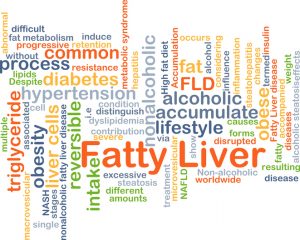 Non-alcoholic fatty liver disease (NAFLD) may be an independent risk factor for atherosclerosis and heart disease. NAFLD is becoming an increasingly common condition, especially among those who are obese or who have type 2 diabetes. Lead investigator Raluca Pais said, “Evidence indicates that the fatty and inflamed liver expresses several pro-inflammatory and procoagulant factors, as well as genes involved in accelerated atherogenesis.”
Non-alcoholic fatty liver disease (NAFLD) may be an independent risk factor for atherosclerosis and heart disease. NAFLD is becoming an increasingly common condition, especially among those who are obese or who have type 2 diabetes. Lead investigator Raluca Pais said, “Evidence indicates that the fatty and inflamed liver expresses several pro-inflammatory and procoagulant factors, as well as genes involved in accelerated atherogenesis.”
Senior author Professor Vlad Ratziu added, “This raises the possibility that the link between NAFLD and cardiovascular mortality might not simply be mediated by shared, underlying, common risk factors, but rather that NAFLD independently contributes to increasing this risk.”
Advertisement
The researchers conducted a large retrospective study involving nearly 6,000 patients. They assessed cases of NAFLD and the rise of atherosclerosis and heart disease.
The patients were examined using carotid ultrasound and assessed for heart disease risk factors.
Long-term follow-up for 1,872 patients after eight years confirmed that patients with NAFLD face a higher risk of atherosclerosis and heart disease, as they are more likely to have carotid plaque buildup over time.
Dr. Pais added, “Regardless of the mechanisms involved, the clinical implications are of critical importance since patients at cardiovascular risk presenting with one or more metabolic syndrome characteristics are at even greater risk if they have steatosis. We also found that patients with steatosis, but not overweight, not type 2 diabetic, or without arterial hypertension are at higher risk of developing these complications than individuals without steatosis. This indicates that NAFLD is a precursor of metabolic syndrome. It follows that the diagnosis of steatosis is extremely important and, therefore, a thorough cardiovascular and metabolic work-up and strict monitoring of CVD [cardiovascular disease] or metabolic complications are needed in the clinical management of NAFLD.”
Experts Leon Adams and Quentin M. Anstee commented in an accompanying editorial, “Taken as a whole, the bulk of evidence suggests NAFLD increases cardiovascular risk, although this relationship may be modified by other factors. The clinical implications of this paradigm may alter the decision to institute primary prevention strategies with anti-platelet, lipid-lowering or anti-hypertensive drugs. A further intriguing thought is whether fatty liver can be a therapeutic target for cardiovascular risk reduction. Clinicians should be aware of the increased cardiovascular risk in patients with NAFLD and consequently screen for conventional cardiovascular risk factors and use accepted risk calculators to make decisions regarding preventative pharmacotherapy, including statins.”
Treatment options to prevent non-alcoholic fatty liver disease
Because a fatty liver can contribute to a slew of serious health conditions, including liver failure, it’s important to take the necessary steps to prevent it. Tips to prevent a fatty liver include:
- Lose weight and exercise – fat can penetrate liver cells, causing a fatty liver, which contributes to liver fibrosis.
- Improve diet – not only will a healthy diet help you lose weight, but the right foods can promote liver health. Opt for foods that work with your liver and won’t make it work harder. Red meat, for example, is hard for the liver to break down, so you may wish to limit your intake.
- Stick to one glass of wine – although alcohol is usually to blame for many liver conditions, sticking with one glass of wine can work to prevent a fatty liver, according to research from the University of California – San Diego School of Medicine.
- Treat other medical conditions – diabetes, hypertension, and high cholesterol can all contribute to fatty liver.
